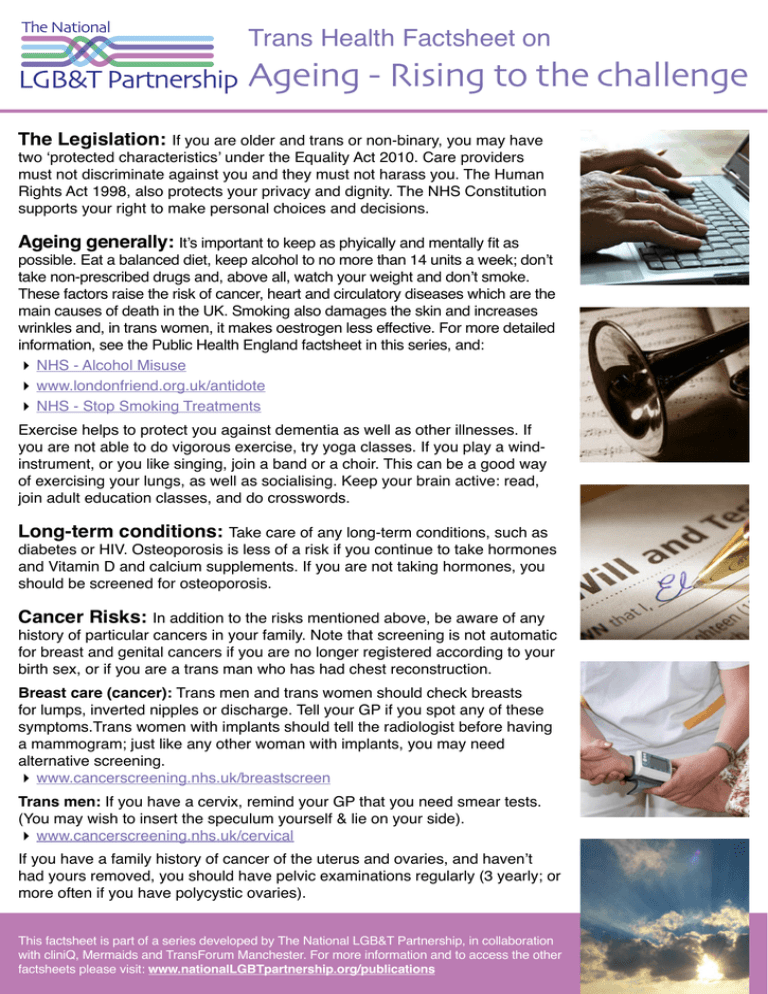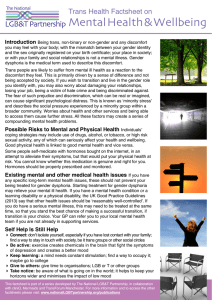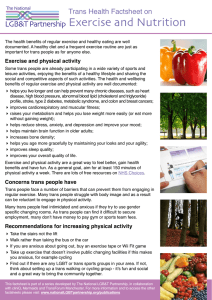Ageing - Rising to the challenge LGB&T Partnership Trans Health Factsheet on
advertisement

The National LGB&T Partnership Trans Health Factsheet on Ageing - Rising to the challenge The Legislation: If you are older and trans or non-binary, you may have two ‘protected characteristics’ under the Equality Act 2010. Care providers must not discriminate against you and they must not harass you. The Human Rights Act 1998, also protects your privacy and dignity. The NHS Constitution supports your right to make personal choices and decisions. Ageing generally: It’s important to keep as phyically and mentally fit as possible. Eat a balanced diet, keep alcohol to no more than 14 units a week; don’t take non-prescribed drugs and, above all, watch your weight and don’t smoke. These factors raise the risk of cancer, heart and circulatory diseases which are the main causes of death in the UK. Smoking also damages the skin and increases wrinkles and, in trans women, it makes oestrogen less effective. For more detailed information, see the Public Health England factsheet in this series, and: NHS - Alcohol Misuse www.londonfriend.org.uk/antidote NHS - Stop Smoking Treatments Exercise helps to protect you against dementia as well as other illnesses. If you are not able to do vigorous exercise, try yoga classes. If you play a windinstrument, or you like singing, join a band or a choir. This can be a good way of exercising your lungs, as well as socialising. Keep your brain active: read, join adult education classes, and do crosswords. Long-term conditions: Take care of any long-term conditions, such as diabetes or HIV. Osteoporosis is less of a risk if you continue to take hormones and Vitamin D and calcium supplements. If you are not taking hormones, you should be screened for osteoporosis. Cancer Risks: In addition to the risks mentioned above, be aware of any history of particular cancers in your family. Note that screening is not automatic for breast and genital cancers if you are no longer registered according to your birth sex, or if you are a trans man who has had chest reconstruction. Breast care (cancer): Trans men and trans women should check breasts for lumps, inverted nipples or discharge. Tell your GP if you spot any of these symptoms.Trans women with implants should tell the radiologist before having a mammogram; just like any other woman with implants, you may need alternative screening. www.cancerscreening.nhs.uk/breastscreen Trans men: If you have a cervix, remind your GP that you need smear tests. (You may wish to insert the speculum yourself & lie on your side). www.cancerscreening.nhs.uk/cervical If you have a family history of cancer of the uterus and ovaries, and haven’t had yours removed, you should have pelvic examinations regularly (3 yearly; or more often if you have polycystic ovaries). This factsheet is part of a series developed by The National LGB&T Partnership, in collaboration with cliniQ, Mermaids and TransForum Manchester. For more information and to access the other factsheets please visit: www.nationalLGBTpartnership.org/publications Trans Health Factsheet on Ageing - Rising to the challenge Trans women: Prostate glands can become cancerous. Low testosterone levels won’t keep you safe from other kinds of cancer. www.cancerscreening.nhs.uk/prostate General genital care: Your needs will vary depending on any surgery you have had, and whether or not you are sexually active. Both trans men and trans women (and/or their partners) and those who are non-binary should use condoms and lubricant, because older genital tissue is more vulnerable to damage and infection. Trans men following phalloplasty should report any difficulty in peeing; the urethra may be blocked. Erectile prostheses last roughly 7 years - keep the date in the diary. Trans women, to prevent the vagina closing, should continue dilating unless you are having penetrative sex. Residential and End of Life Care: NHS Regulations (2014): “care is focused on dying people’s wishes - rather than processes. This will make sure that their voices, and those of their families, are heard at all times.” Families are defined as “the people important to the dying person”. Decisions about care are “in accordance with the person’s needs and wishes”. “Care is tailored to the individual and delivered with compassion”; “comfort and dignity is prioritised”. You may, for instance, specify whether you wish personal care to be undertaken by a man or a woman. Your legal entitlements to protection continue. Age UK provides information about trans issues in later life: Factsheet Transgender issues and later life An “individual care plan” (a kind of living-will) is suggested: Department of health: New approach to care for the dying published Writing an Individual Care Plan: If you haven’t already written a Care Plan, you should do it now, to ensure that you will be treated according to your wishes, by those providing care for you both before and after your death. Make sure that you always have a copy of your Plan on you, and that your GP, other carers, and your designated next-of-kin (see below) all have copies. If your family is hostile to your transition, include this information in your instructions, so that your family’s wishes will not override yours where there is disagreement. This is especially important to protect you, in case you develop dementia and are no longer able to speak for yourself. See the document “I’m still me”. Details should include: how you wish to be dressed, including any prostheses, for instance: trans women may need wigs or head-covering, see: www.headwear4hairloss.co.uk; trans men may need breast binders and packers; names, pronouns, titles (Mr, Mrs, Miss, Ms or Mx) should be as you request, except that the death certificate will carry your old name if you do not have a gender recognition certificate. These details should be passed on to the coroner, mortuary staff, and the person conducting your funeral. Next of kin, nearest relative, power of attorney: If you are married or in a civil partnership, that person will probably be regarded as your next-of-kin, or you can appoint someone to be your next-ofkin. If nobody is acting in this role, care-providers might ask a sibling or child, for instance, to act as your ‘nearest relative’ in situations where you are unable to make decisions. If you would not be comfortable with that, you can, in addition, give a chosen person ‘lasting power-of-attorney’ to ensure that your personal wishes are upheld. For more detailed information, see: Bereavement: A guide for Transsexual, Transgender people and their loved ones The National LGB&T Partnership This factsheet is part of a series developed by The National LGB&T Partnership, in collaboration with cliniQ, Mermaids and TransForum Manchester. For more information and to access the other factsheets please visit: www.nationalLGBTpartnership.org/publications





